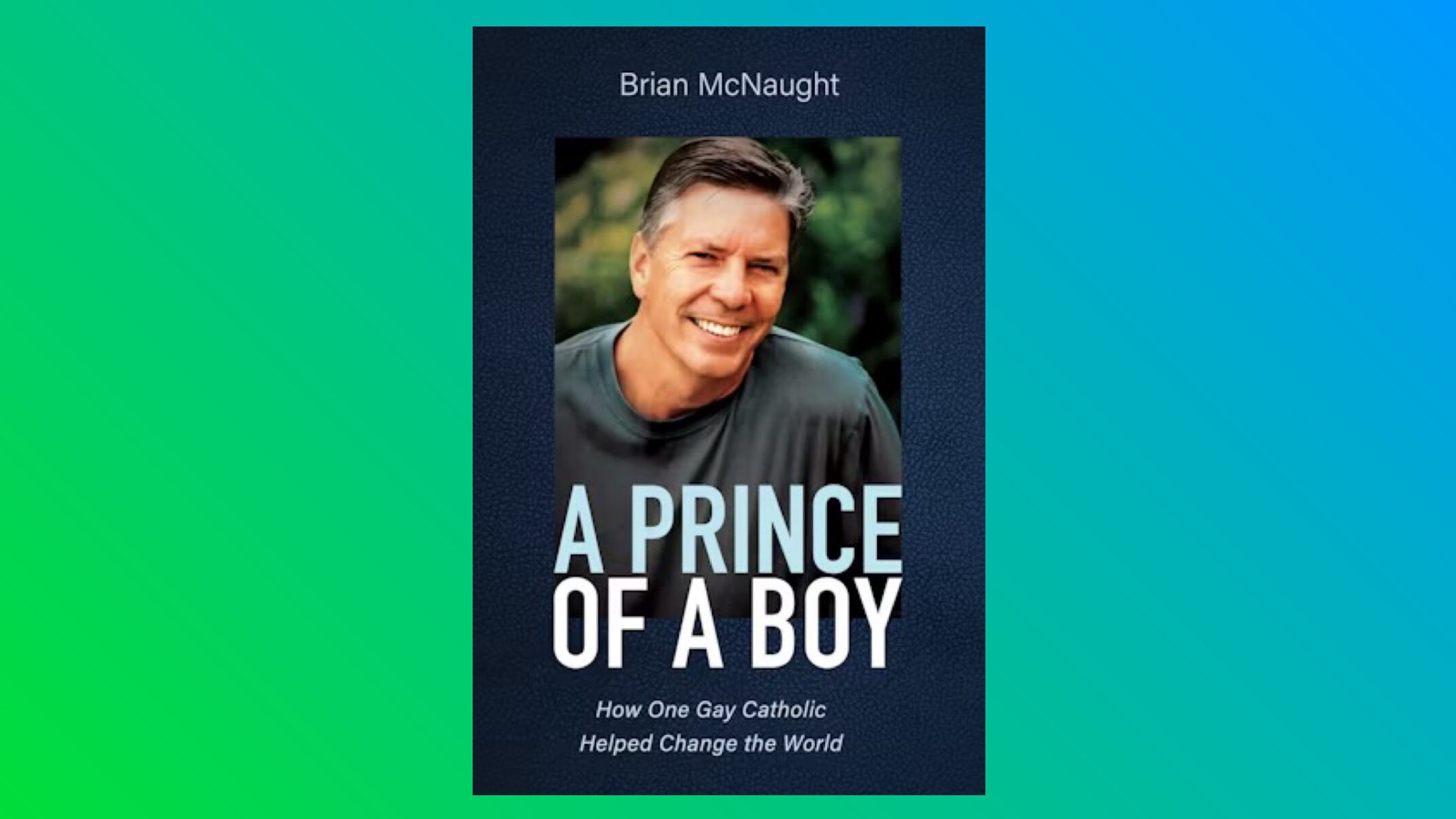If you’re an LGBTQ Catholic who grew up in the late 20th century, you probably know something about Brian McNaught. A renowned author, corporate educator and advocate for the LGBTQ community, McNaught has been one of the most prominent openly gay men in the Roman Catholic Church and U.S. public life for the last half-century. Now in his late 70s, McNaught recently released his autobiography, A Prince of a Boy: How One Gay Catholic Helped Change the World (Cascade Books, 2024).
The book’s regal title refers to words used by Sr. Claire Marie, I.H.M., to describe the adolescent Brian, then a precocious and well-behaved student in her eighth-grade class. The son of an auto executive, McNaught grew up in a well-to-do Catholic family outside of Detroit. McNaught shot to fame after he publicly came out and lost his column writing for The Michigan Catholic, a job he had taken as a conscientious objector to the Vietnam War. His subsequent 17-day water fast, following his termination, drew national attention to the injustices that gays and lesbians faced in society and the church.
Later, McNaught helped form the Detroit chapter of LGBTQ Catholic ministry DignityUSA and participated in the 1976 Call to Action Conference, a Vatican II-inspired national gathering of lay and ordained grassroots Catholic leaders where he was the only openly gay representative. In the years that followed he became one of the most recognizable gay men in the country due to his willingness to educate and engage critics, such as the time he participated in a televised debate with a representative from Anita Bryant Ministries. After a stint in Boston-area politics and advocacy, McNaught became a corporate educator, leading the New York Times to describe him as the “godfather of gay diversity and sensitivity training.”
McNaught is a good storyteller. Reading his autobiography is like sitting down for a cup of coffee with him—conversational, friendly, at times tangential. Remember those studded jeans Sr. Jeannine Gramick wore to the first national gay and lesbian Catholic ministry conference? How about that time McNaught sat next to Cardinal Law on a Boston-bound flight, and the prelate denied receiving the author’s book of essays?
McNaught is a good storyteller. Reading his autobiography is like sitting down for a cup of coffee with him—conversational, friendly, at times tangential.
It might be helpful for the unacquainted to read a short biography of McNaught or his Wikipedia page before diving into his autobiography. Many of his stories will be familiar to those who have followed his newspaper columns or participated in his workshops. Nevertheless, the book remains intensely personal and is so full of detail that even long-time friends and fans will learn something new. McNaught’s decades of experience in the public sphere pay off with gems of reflection: the importance of presence in public speaking, the power of storytelling to transform hearts, the freedom that comes from embracing one’s God nature.
A Prince of A Boy is inspirational, and it is also a valuable resource for those interested in early LGBTQ Catholic and corporate diversity, equity and inclusion histories, two worlds that, outside of McNaught’s life, rarely seem to cross. McNaught writes with present and future historians in mind, alerting the reader to where they can find his archives, videos and writings and even an email address to write to him personally. McNaught has mentored generations of LGBTQ people and allies; this book secures his legacy as a gay elder who is eager to continue dialoguing with his audience.
As the subtitle suggests, A Prince of A Boy: How One Gay Catholic Changed The World is occasionally hagiographic. Readers will find that McNaught is comfortable in his own skin and proud of telling his story, but this doesn’t mean that his life has been all roses and accolades. He shares intense moments of vulnerability—a suicide attempt because of a bad relationship in his early 20s, the death of a dear friend in a car crash decades later, his long-felt “need to feel needed.” McNaught does not sugarcoat these experiences, but they do not define him or limit the joy and gratefulness his life exudes. This is especially clear in his relationship with Ray, his loving partner of many decades.
McNaught’s honesty allows him to address parts of LGBTQ Catholic history that seem impossible for many others to confront.
McNaught’s honesty allows him to address parts of LGBTQ Catholic history that seem impossible for many others to confront. In a church and world that often falsely equates pedophilia and homosexuality, McNaught freely discusses the role of Paul Shanley, the defrocked Boston priest whose trial and conviction helped set off the U.S. Catholic sex abuse crisis, in the early years of the LGBTQ Catholic movement. More surprising, McNaught’s friendship with Shanley after the priest’s conviction reveals the complexity of human relationships and need for compassion, especially toward those considered the worst criminals. In this case and many others, McNaught’s heart seems as open as his book.
More than half a century after the Stonewall riots, and a decade after Obergefell legalized same-sex marriage, McNaught reminds us of the struggle that he and others endured to secure the civil rights we enjoy today. Many times, he was the only openly gay person someone in his audience might know. He was often insulted and denounced by his opponents. As one who “built bridges” between Catholic and gay and lesbian communities, he was suspected and despised by both.
McNaught’s history telling is especially important in light of recent attempts by the Trump administration to roll back LGBTQ civil rights (especially for trans folks). At a time when the queer community is increasingly threatened, McNaught’s story brings wisdom, perspective, grace and grounding.
At a time when the queer community is increasingly threatened, McNaught’s story brings wisdom, perspective, grace and grounding.
Some readers might wonder about McNaught’s privilege as the son of a business leader who, for much of his career, benefitted from the corporate world. McNaught doesn’t criticize the capitalism that sustained his vocation. As companies in 2025 slash D.E.I. initiatives, the reader might question how advocacy like his will continue. Throughout his career, McNaught defended his work using terms business interests would understand: “In the war for talent, in order to attract and retain the best and brightest people, the company has to create an environment in which every employee feels safe and valued.”
If diversity and sensitivity training accomplish these aims, we might expect the continued corporate sponsorship of Pride parades, rainbow advertising in June and workplaces attuned to the needs of LGBTQ workers and their families. If not, what might the future of LGBTQ advocacy look like vis-à-vis for-profit companies? Some queer folks hope for a more robust accounting of corporate greed and advocacy for the poor.
If the label of gay “Catholic royalty” applies to anyone, McNaught certainly fits the bill, although, as he shares, his spiritual life has expanded beyond traditional Catholicism to include Joseph Cambell, Pema Chodron, the Tao Te Ching, Body Electric and Alcoholics Anonymous, among others. In many ways, McNaught’s journey to spiritualities outside the institutional Catholic Church is emblematic of many queer people raised in the tradition. He writes:
Emotionally and spiritually wounded Gay people of faith aren’t quick to return to the site of their abuse. There are Gay and Lesbian Catholics who go to the Sunday Mass, but the majority of Gay Catholics will say they are in recovery, and no longer enter a church.
One of the greatest joys reading McNaught is learning about the peace he’s found in his relationship to the divine, which includes intimacy with Jesus and a strong identity as a cradle Catholic, but also the life lessons that have brought him other sources of spiritual connection and understanding.
McNaught’s honesty and wisdom is much needed in a world that feeds division and misunderstanding. Summing up much of his life work, McNaught writes:
My mantra from the beginning of my unintended career of being an educator on Gay, Lesbian, Bisexual, and Transgender issues, initially in the Catholic Church, then on college campuses, then in the City of Boston’s mayor’s office, and finally in the workplace is that ignorance, by which I mean lack of familiarity, is the parent of fear, and fear is the parent of hatred. If people are given the opportunity to safely listen to new information, shared not with anger but with loving kindness, you can turn a person’s life around, and that of their family members and friends.
If there is hope for queer people in the Catholic Church and our political system today, it may come from leaders like Brian McNaught who teach through storytelling and dialogue. His book serves as a helpful resource for anyone in need of courage and know-how to change the world.




